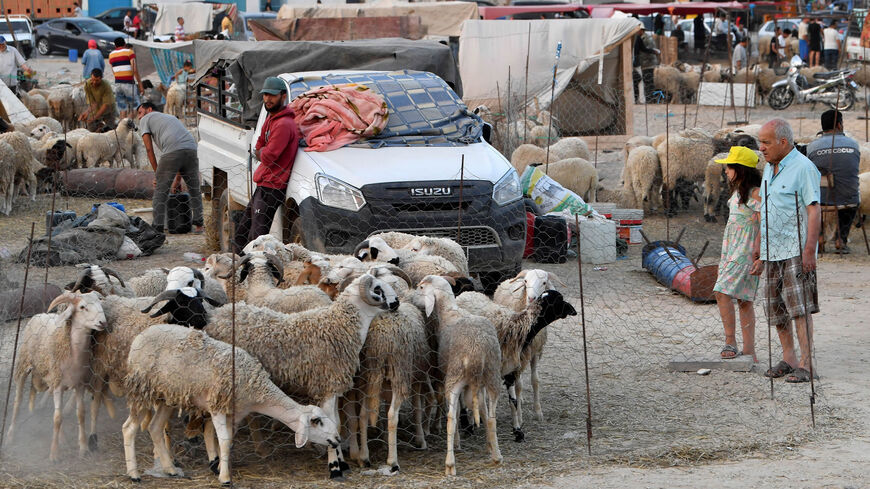TUNIS — Saber, who owns a small farm in Tunisia’s northern town of Testour, shrugs as he looks at his 12 unsold sheep at an open-air cattle market outside Tunis. He is one of many sheep vendors in Tunisia who are struggling ahead of Eid al-Adha, expected on Wednesday, to make a living as inflation soars in the north African country.
"This is the worst year for business," Saber told Al-Monitor while manning his modest stand, juggling inquiries from a few potential buyers before they continue their search. “The prices are higher and people can’t afford sheep anymore.”
“I came all the way from Testour [80 kilometers west of Tunis] and today will be my last day,” he said. “I’ll take the rest of my sheep to the slaughterhouse and go home.”
Days before Eid al-Adha — Islam’s most important holiday that marks the end of the haj pilgrimage season — Saber is one of many farmers who are having a harder time than usual in selling their cattle. During Eid, Muslims observe the tradition of slaughtering an animal, typically a mature sheep, which gives sellers a steady stream of business. However, this year's economic crisis has taken a toll on everyday Tunisians, making it increasingly challenging for them to afford such a luxury.
“It’s getting harder to buy even basic things, let alone a sheep,” Halima Ayari, a woman from the Medina of Tunis, told Al-Monitor. “I will never be able to buy a sheep.”
“Sheep are extremely expensive this year,” Houcine Zammouri, a civil servant from Medenine in the southeast, told Al-Monitor. “Even families that earn 1,000 Tunisian dinars [$323] a month cannot afford to buy a sheep. Years ago, 1,000 Tunisian dinars used to be good money for a family of five.”
This year, the price of sheep ranges from 500 Tunisian dinars ($161) for a small ewe to more than 2,000 Tunisian dinars ($646) for a large ram. The price of a mid-sized sheep is around 900 Tunisian dinars ($291), representing a 25% increase from last year. One reason for the price spike is the increasing cost of fertilizer and animal feed, driven up by the conflict in Ukraine, which exports more than a third of the world’s wheat. Another is an unprecedented drought that has threatened Tunisia’s own cereal production.
“I’ve had to pay triple for wheat just in the past year,” Amor, an elderly farmer from the central village of Makthar, told Al-Monitor at a street-side cattle market in the poor neighborhood of Mallasine in downtown Tunis. “That means I’ve had to raise my prices just to make a profit. And fewer people are willing to buy sheep.”
But it is not just global supply disruptions and climate change that are impacting the market — Tunisia’s soaring inflation and a floundering currency are also to blame. While wages have stagnated, prices are up 10% across the board. The government is increasingly struggling to cover basic food subsidies, such as those on bread, couscous and oil, that the poor once took for granted.
The result has been devastating for Tunisia’s working class, who can no longer afford anything beyond the bare necessities, economist Tarak Bouacida told Al-Monitor. “Fruit and meat has become inaccessible. People are having to make sacrifices.”
On the macroeconomic level, the picture is equally dire. Tunisia desperately needs external financing to meet its debt obligations that are piling up, and negotiations with the International Monetary Fund (IMF) over a $1.9 billion bailout are at an impasse. Fitch Ratings, the international credit rating agency, recently downgraded Tunisia’s credit score to CCC-, indicating a high risk of default on its loans — the fourth such downgrade by the agency in three years. And despite a few recent positive economic signals, such as a $268 million energy partnership with the World Bank and a rebounding tourism sector, Tunisia is still short billions of dollars it needs to balance its 2023 budget.
According to many economists, a deal with the IMF, which Tunisia has been negotiating for the better part of the year, is the obvious way forward. However, this would require unpopular subsidy cuts that the president has shown little appetite for. In April, President Kais Saied rejected the IMF’s loan conditions, reneging on a preliminary agreement his government had reached just six months earlier. Saied said he would not accept foreign “diktats” that would hurt the country’s poor, instead suggesting he could come up with needed funds by taxing the rich.
Bouacida said the IMF is still keen to provide assistance to Tunisia if it can receive some form of goodwill from the Tunisian government. “However, the president has so far been unwilling to show any such goodwill. He still believes there are other ways out without caving in,” Bouacida added.
Another major source of financing could come from the European Union, which is looking to Tunisia to curb a wave of migration that has brought more than 50,000 people to its shores this year. On June 11, the European Commission, headed by its President Ursula von der Leyen, proposed an economic aid package of more than $1 billion, including a crucial $150 million in immediate budget assistance, in return for its partnership on migration. Under the deal, Tunisia, which has become the main launching point for migrants crossing the Mediterranean into Europe, would be expected to tighten up its borders and likely readmit asylum-seekers from sub-Saharan Africa. Such a deal would be reminiscent of the famous 2016 EU-Turkey deal, in which the EU offered Ankara around $6.5 billion in assistance to keep and resettle millions of Syrian refugees in its territory.
Rights activists have hit out at the potential migration agreement between the EU and Tunisia, saying it is a form of economic blackmail and could leave migrants even more vulnerable to hardship and abuse.
Publicly, Saied has scoffed at such an arrangement as well, saying Tunisia will not play the role of Europe’s border guard. However, Saied may be more likely to bend on this issue than he lets on, Bouacida said, as he runs out of financing options and the state’s bills stack up.
“The concessions [the EU] is asking for are less politically charged than the IMF’s — it wants Tunisia to stop migrants from entering Europe, to become a sort of hub for migrants. … Such an arrangement is not necessarily public and could be managed; subsidy cuts, however, are very public. Everyone would feel it,” Bouacida added.
How Tunisia’s government manages the faltering economy is the predominant concern of the country’s working-class, who are reporting higher rates of poverty than at any time since the revolution. According to a recent survey from Pan-African research center Afrobarometer, more than 20% of Tunisians say they have gone without enough food “at least several times” in the past year, while more than 50% have gone without clean drinking water.
Times like Eid, when families are meant to celebrate their blessings and give to the poor, make such challenges even more acute. However, “many people will still do their best to celebrate Eid,” said Zammouri, from Medenine, even if that means having to forgo a sheep “for a skinny goat or a few kilograms of meat from the market. … For some, Eid is their only chance to taste red meat all year.”
Ayari, from the Medina of Tunis, highlighted the acts of kindness that still prevail despite the economic hardship. "In Sidi Brahim Riahi — a saint's shrine in the Tunis medina — people give meat to the poor on the night of Eid. At least there's that. … The poor can still taste meat there once in a while,” she said.








